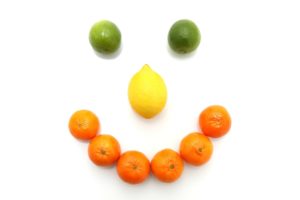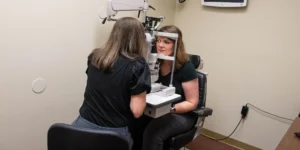Most of us are well aware that our overall diet and lifestyle choices affect not only our weight but also the health of our heart, skin, liver, and other organs. Well, the human eye is also an organ and a complex one at that. 
The nutrients in certain foods and supplements can support eye health, and we’re not just talking about carrots. Here are the essential foods or nutrients that we recommend for optimal eye health, based on preventing or improving common eye conditions:
Fish Oil: Dry Eyes & Macular Degeneration
One of the most common complaints people have when visiting their eye doctor is irritated or gritty feeling eyes, which is often caused by dry eyes. A qualified eye doctor can determine the likely cause and severity of your dry eyes, but the omega-3 fatty acids in fish oils can help.
According to Dr. Thompson, fish oil is beneficial for dry eyes because it contains both EPA and DHA omega-3 fatty acids, which promote strong cell membranes throughout the body, including in the eyes. You can find many over-the-counter fish oil supplements, just be sure they are labeled for both EPA and DHA fatty acids.
Of course, you can also get omega-3 benefits from grilled fish, and the best sources for EPA and DHA fatty acids are salmon, tuna, and halibut. These omega-3 fatty acids are also beneficial for age-related macular degeneration.
Vitamin A & Zinc: General Eye Health & Macular Degeneration
Carrots have such a great reputation for eye health because they contain naturally occurring beta-carotene, but other orange-colored vegetables and fruits such as sweet potatoes, apricots, and cantaloupe are also high in beta-carotene.
The superpower of beta-carotene is that our bodies convert it into Vitamin A, which is essential for helping our eyes convert light into brainwaves and keeping our corneas healthy. In parts of the world where people don’t get enough Vitamin A, vision problems are rampant. Without Vitamin A, the photoreceptors in your eyes deteriorate and your corneas can actually vanish.
Beta-carotene is also very beneficial for slowing down age-related macular degeneration, which is why beta-carotene is one of the main ingredients in eye vitamins formulated for specific conditions like macular degeneration.
All that said, Vitamin A is useless with the presence of the mineral zinc, which is necessary to carry vitamin A from our livers to our retinas. Zinc is found in many multivitamins, but reliable food sources include beans, nuts, oysters, and meats.
Greens, Eggs & Citrus: Cataracts & Macular Degeneration
Food sources that are high in the nutrients lutein and zeaxanthin—including leafy green vegetables like spinach and kale and spinach, as well as broccoli, peas, eggs, and corn—are believed to lower the risk of cataracts and age-related macular degeneration.
Also, citrus fruits like oranges, grapefruit, and lemons are high in vitamin C, which benefits overall eye health and helps to prevent or perhaps delay cataracts and macular degeneration. Red peppers, peaches, tomatoes, and strawberries are also high in vitamin C and offer similar benefits.
The key takeaway is that certain foods and supplements can most certainly influence the health of your eyes, just like they do the health of your heart, skin, liver, or other organs. However, even the healthiest diet must be paired with regular eye exams for optimal, long-term eye health and vision. Schedule regular appointments with your eye doctor, including additional exams if you notice any changes in your vision.
Located at 10904 Spring Bluff Way off Hardin Valley Road, Hardin Valley Eyecare & Optical has provided the highest quality vision care products and trusted optometry services to our patients in Knoxville and the surrounding areas since 2009. Our eye care professionals are dedicated to providing exceptional personal service to each and every person who walks through our door. Call us at (865) 409-1253 or contact us to request an appointment.





